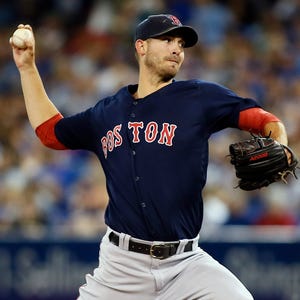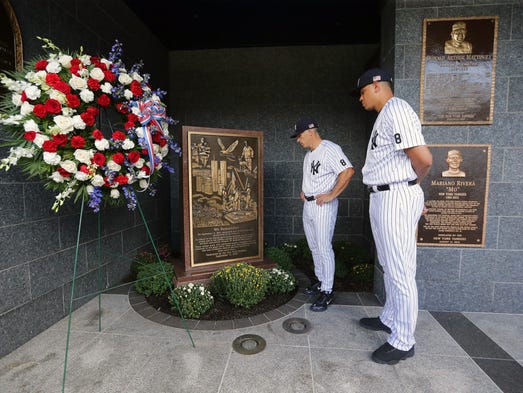Adam Jones on MLB’s lack of Kaepernick protest: ‘Baseball is a white man’s sport’ – USA TODAY
DETROIT – We see the silent, powerful and contentious protests now almost every time we turn on the TV and watch an NFL game.
It started with San Francisco 49ers quarterback Colin Kaepernick sitting, and later kneeling, during the national anthem during the NFL exhibition season. He was soon joined by teammate Eric Reid. It extended to Denver Broncos linebacker Brandon Marshall before Thursday’s NFL season opener.
By Sunday, there were four NFL teams with players expressing silent protests, including Martellus Bennett and Devin McCourty of the New England Patriots, who stood with raised fists following the anthem.
Yet, since that Aug. 26 day when Kaepernick gained attention for his protest against racial inequality in this country – with his season opener scheduled Monday night against the Los Angeles Rams – there have been nearly 250 Major League Baseball games played, and not a single player has taken a stand.
Or, in this case, a knee.
This is the sport that launched the civil rights movement when Jackie Robinson integrated the game of baseball on April 15, 1947, finally breaking the color barrier.
Now, at a time when even entire high school football teams and soccer players are waging silent protests by sitting or kneeling during the national anthem, there hasn’t been a single protest in baseball.
Perhaps someone is quietly sitting on the dugout bench, or even lingering in the clubhouse until the national anthem is over, but no one has publicly made their intentions known.
Why?
“We already have two strikes against us already,’’ Baltimore Orioles All-Star center fielder Adam Jones told USA TODAY Sports, “so you might as well not kick yourself out of the game. In football, you can’t kick them out. You need those players. In baseball, they don’t need us.
“Baseball is a white man’s sport.’’
Indeed, African Americans comprise 68% of the player population in the NFL, and 74% in the NBA. That number is just 8% in baseball, with only 69 African-Americans on the opening-day rosters and disabled lists this season.
This doesn’t mean that anyone who protests racial inequality or police brutality will be released from their teams, or banished from baseball, never to wear a uniform again. Still, in the conservative world of baseball, whose players stand 162 times for the national anthem, playing in front of more fans than any sport in the country, they could face much more ridicule and ostracization.
Jones, 31, one of the most outspoken and passionate African-American players in baseball, certainly empathizes with the injustices that minorities face every day in this country. He sees and hears too many incidents of police brutality in his own city that have unfairly targeted minorities, and was an important voice in the aftermath of protests that followed the death in police custody of Freddie Gray, a series of events that compelled the Orioles to play a 2015 game in front of an empty stadium.
Jones would like to see change, too, but Sunday, just like every other day, he stood at attention during the national anthem before their game against the Detroit Tigers, with his right hand over his heart.
“He believes in what he believes in,’’ Jones says of Kaepernick, “and as a man of faith, as an American who has rights, who am I to say he’s wrong?
“Kaepernick is not disrespecting the military. He’s not disrespecting people who they’re fighting. What he’s doing is showing that he doesn’t like the social injustice that the flag represents.
“Look, I know a lot of people who don’t even know the words to the national anthem. You know how many times I see people stand up for the national anthem and not pay attention. They stand because they’re told to stand.
“That’s the problem. Just don’t do something because you’re told to do something. Do it because you understand the meaning behind it and the sacrifice behind it.’’
Whether you agree or disagree with Kaepernick’s method to draw attention to the inequalities in this country, Jones is dismayed how the public views Kaepernick compared to 49er teammates. Go ahead, check out the difference in coverage since Kapernick sat during the national anthem compared to his teammate, Bruce Miller. Miller was arrested last week and charged with aggravated assault, elder abuse, threats and battery against 70-year-old man and his 29-year-old son. The 49ers later released him.
“Here’s my thing,’’ Jones says, “there’s somebody on the 49ers’ team that commits an act like that, accosts a 70-year-old man and his kid, and nobody’s talking about that. But they talk about Kaepernick doing something that he believes in, as his right as an American citizen. People need to talk more about that guy than Kaepernick.
“He’s not receiving the ridicule and public torture that Kaepernick is facing. Is Kaepernick hurting me? No. Is he hurting random people out there? No. I support his decision.
“At the end of the day, if you don’t respect his freedoms, then why the hell are we Americans? It’s supposed to be the Land of the Free, right?’’
Jones, who was honored last week by receiving the Orioles’ nomination for the prestigious Roberto Clemente award for his community involvement, philanthropy and contributions, may have chosen a different way to express his views about racial inequality in this country. Yet, his heart aches over the public outrage and abuse Kaepernick has received.
“I’ve seen Kaepernick called the N-word,’’ Jones said, “just because he’s being sensitive to what has happened to African-Americans in this country. It’s crazy how when people of color speak up, we’re always ridiculed. But when people that are not of color speak up, it’s their right.
“The First Amendment says we have freedom of expression. We’re supposed to be so free, so free. But any time anybody of color speaks up in the United States, for some odd reason, they always get the raw end of the deal. It sucks.
“At the end of the day, black men have fought for this right. Indians have fought for this right. White people fought for this right. Mexicans have fought for this right. Japanese have fought this for this right. The United States was not just made up of one race.
“So let’s just not say that in America, only one person can say something. We all have input because America has always been a country that has united everybody.’’
The problem, Jones says, is that most fans don’t want to hear their athletes share their opinions outside the sports world. They’re not supposed to talk about race, religion, political views, or anything that could create ill will, or discomfort among the fan base. You know, stick to sports.
“The outside world doesn’t really respect athletes,’’ Jones says, “unless they talk about what they want them to talk about. Society doesn’t think we deserve the right to have an opinion on social issues.
“We make a lot of money, so we just have to talk baseball, talk football. But most athletes, especially if you’re tenured in your sport, you’re educated on life, and on more things than most people on the outside. But because Donald Trump is a billionaire, he can say whatever he wants, because he’s older and has more money?
“And when Kaepernick does something, or says something, he’s ridiculed. Why is that? ’’
Heavyweight champion Muhammad Ali, Hall of Fame running back Jim Brown, Olympians John Carlos and Tommie Smith and NBA Hall of Famer Kareem Abdul-Jabbar all spoke out about racial inequalities. All survived the public storm of criticism, though some paid a heavier price.
Even Jackie Robinson, the man who Martin Luther King even credited for starting the civil rights movement, became a strong advocate for racial equality during his career and afterwards, and even voiced his opinion about the national anthem in his 1972 autobiography, I Never Had it Made.
“As I write this …I cannot stand and sing the anthem. I cannot salute the flag; I know that I am a black man in a white world. In 1972, in 1947, at my birth in 1919, I know that I never had it made.’’
Once again, Robinson was ahead of his time, opening plenty of doors, but nearly 70 years later, so many are still closed. It provoked Kaepernick to publicly display his discontent, with the movement spreading, and causing everyone to take notice. Due to love or loathing, Kaepernick’s social media presence has increased 35,000% since he spoke up.
In these final three weeks of the regular season, during the postseason, or perhaps even on the national stage of the World Series, we’ll see if any baseball player now dares to take a stand.
“No one has done it, yet,’’ Jones says. “But that’s the key word here: Yet.
“We will see.’’




























































































































































